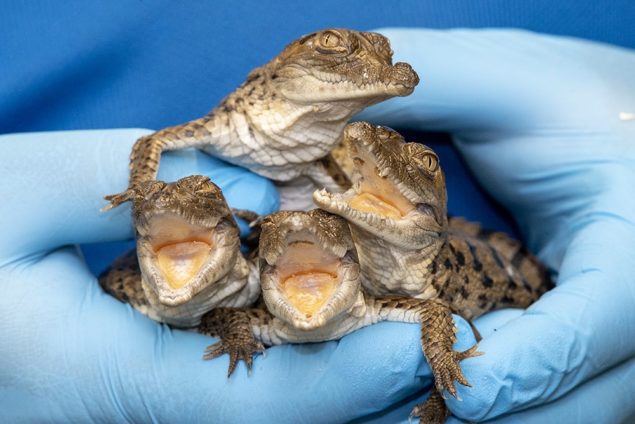|
Getting your Trinity Audio player ready...
|

Just in time for Mother’s Day (May 9) a critically endangered Orinoco crocodile became Zoo Miami’s newest mother.
She laid 45 eggs in a carefully excavated nest located in an off-exhibit holding area on Feb. 5. To prevent any loss due to predation or extreme weather events, the eggs were carefully collected by zoo staff on Feb. 12 and placed into incubators.
On May 2, 85 days after being laid, the first egg pipped and soon the hatchling had fully emerged from the egg. Since that time, other individuals have fully hatched. The hatching period is spread out because the eggs have been incubated in two separate incubators kept at different temperatures. The reason for this is because the sex of all crocodilians is determined by the temperature at which the eggs are incubated.
Generally speaking, cooler temperatures produce females and warmer temperatures produce males. By incubating the eggs in separate incubators with warmer and cooler temperatures, the hope is to have an even ratio of males to females.
Orinoco crocodiles are one of the world’s most critically endangered crocodilians due to extensive hunting for their skin and meat. Found in isolated pockets of the Orinoco River basin in Venezuela and the Meta River basin in Colombia, they are the New World’s southernmost species of crocodile. Very similar in appearance to the American crocodile, the Orinoco crocodile gets slightly larger with historical records of huge males approaching 20 feet in length.
They are opportunistic hunters, feeding on a wide variety of fish, birds and small mammals with capybaras being a favorite.
The mother actually hatched at Zoo Miami back in 1980 and then went to several institutions until returning to Zoo Miami in 2019 from the Everglades Alligator Farm. The father was hatched at the Dallas World Aquarium in March 2004 and arrived at Zoo Miami in November 2006. This is their first clutch together. The hope is to eventually return these hatchlings to the wild.





